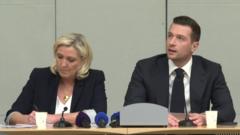Former President Nicolas Sarkozy's corruption conviction was upheld by France's Cour de Cassation, mandating he wear an electronic monitoring bracelet for a year, as he contemplates legal action at the European level.
Sarkozy's Corruption Conviction Upheld by France's Highest Court

Sarkozy's Corruption Conviction Upheld by France's Highest Court
The former French president plans to appeal to the European Court of Human Rights.
Former French President Nicolas Sarkozy faced a significant legal setback as France's highest court, the Cour de Cassation, upheld his corruption conviction on Wednesday. The ruling confirms that Sarkozy, who held office from 2007 to 2012, is now required to wear an electronic monitoring bracelet for a duration of one year following his 2021 conviction.
The 69-year-old Sarkozy announced his discontent with the ruling, labeling it as "profound injustice." He expressed intentions to challenge the court's decision by appealing to the European Court of Human Rights, indicating the legal battle is far from over for the controversial figure.
Originally sentenced to three years in prison for his attempts to bribe a judge in 2014, Sarkozy's punishment included two years suspended and a single year converted to electronic monitoring. The conviction arose from allegations that he encouraged a judge to provide confidential information regarding a separate legal matter by proposing a prestigious job offer.
In the 2021 ruling, Judge Christine Mée underscored Sarkozy's awareness of the wrongdoing associated with his actions, emphasizing the negative impact on public perception of the judicial system. The specific legal charges included influence-peddling and violation of professional secrecy, marking a significant moment in the legal history of post-war France.
Sarkozy's attorney, Patrice Spinosi, confirmed that his client would adhere to the terms of the ruling despite the plans to escalate the case to a higher legal authority. With this decision, Sarkozy has exhausted his options within the French legal framework, further complicating his quest for justice.
This conviction stands out as a landmark case following the trial of Sarkozy's predecessor, Jacques Chirac, who received a two-year suspended sentence in 2011 for related corruption charges during his tenure as mayor of Paris. Chirac's passing in 2019 leaves Sarkozy's case as a critical touchpoint in understanding the intersection of politics and law in modern France.


















